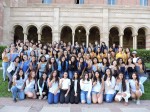A presidential medal of freedom honoree said Latinos should be recognized for their efforts to end segregation at a conference Saturday.
Sylvia Mendez spoke at Hermanas Unidas de UCLA’s Health and Education Conference, a yearly community service project that invites Latina high school girls from Southern California to tour the UCLA campus and take part in workshops on mental health, women empowerment and academics.
Hermanas Unidas strives to improve the retention of Latina women in higher education through academic support, community service events and collegiate networking, said Evelyn Zamora, fourth-year psychology student and the organization’s co-chair. The organization was founded in 2000 as UCLA’s chapter of Hermanas Unidas, a California-wide organization founded in 1994.
The conference was organized by Karla Aparicio, a third-year political science student and community service chair of the organization. She invited Mendez, a civil rights activist, to give the conference’s keynote address this year because of her role in desegregating California, Aparicio said.
“She’s someone that a lot of girls can see themselves in. I just thought she was so important to have,” Aparicio said. “It really was a shot in the dark to email her.”
Mendez is known for her involvement in Mendez v. Westminster, a landmark desegregation case in 1947 that ended segregation in California schools and preceded the famous Brown v. Board of Education case, which ended segregation nationally.
Mendez’s parents sued her local school district after she was denied entry into a white-only elementary school. She has advocated for the teaching of this case for decades.
“Nobody knows about it,” she said. “It was Latinos that helped integrate this great state of California, and California was the first state to be integrated. … Somebody has to go and tell this story, that Latinos have always been courageous, have always wanted the best for their children.”
Mendez encouraged the girls at the event to pursue higher education, to participate in civic engagement and to hold onto their cultures despite having to face disproportionate challenges.
“I know for a fact that, if you are a woman in a minority, you will have a hard time,” Mendez said. “You will work harder to prove you are equal. And we can do it.”
Over 80 high school girls attended the daylong conference, 10 more than last year, Aparicio said.
“The students’ reaction to Sylvia Mendez was really inspiring, really empowering,” Aparicio said. “We had a really big turnout. It’s our largest conference in our history.”
Aparicio worked to increase the turnout at the event by reaching out to professors she met while pursuing her education minor. She also had her peers in Hermanas Unidas reach out to their high school teachers and counselors to get the word out, Aparicio said.
The conference is one of about 15 community service projects that Hermanas Unidas undertakes every quarter. Members have volunteered with The Compton Initiative to paint homes and clean streets. They have also collaborated with other student organizations such as BruinHope and Hermanos Unidos de UCLA to visit and donate resources to an orphanage in Tijuana, Mexico, Aparicio said.
In addition to community service, Hermanas Unidas focuses on supporting its members academically. Zamora said she was motivated to join after experiencing culture shock at UCLA.
“I saw a lot of students that didn’t look like me or that came from really privileged backgrounds,” Zamora said. “So I really wanted to seek that community where I felt welcomed.”
Hermanas Unidas aims to create an inclusive environment for Latina women to pursue their academics. About 200 girls every quarter make use of academic study hours that are offered every day of the week from morning to evening at campus libraries. Members are also asked to send in each A they receive to help the organization reach its goal of generating 100 A’s every quarter, Zamora said.
Hermanas Unidas is often referred to as a “home away from home” by active members. People of color need such spaces at UCLA, Zamora said.
“I think an organization like this is really important to make sure students of color have a space (in a place) where they are not always welcomed,” Zamora said. “We make sure that Latina women are pushed at the same level as white students or privileged students are being pushed.”
Nataly Barba, a third-year psychology and Chicana and Chicano studies student, is an advisor within Hermanas Unidas. Her role is to welcome new members through on-campus socials and off-campus retreats, she said.
“It’s that time to take one step away from campus,” Barba said. “Sometimes you need a break. … We kind of show them how to take care for themselves. Mental health does matter.”
Like many new students, Barba worried about making friends in her classes of hundreds of students during her first year. However, the bonds made in Hermanas Unidas go a long way in alleviating those worries, Barba said.
“You feel alone, you feel intimidated, … and then you see an hermana sitting there,” Barba said. “Just that itself brings so much joy, brings so much motivation and so much self-fulfillment, that there’s another hermana in that class, because that means you’re not lonely anymore.”
Contributing reports by Kate Nucci, Daily Bruin contributor.
